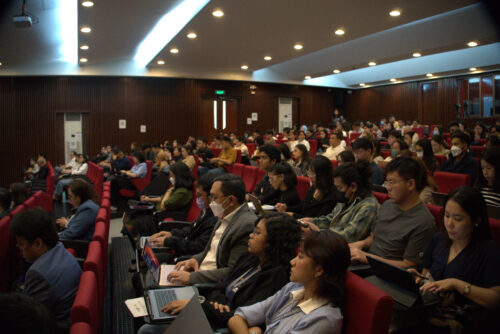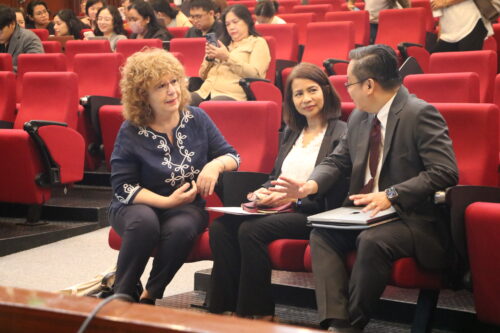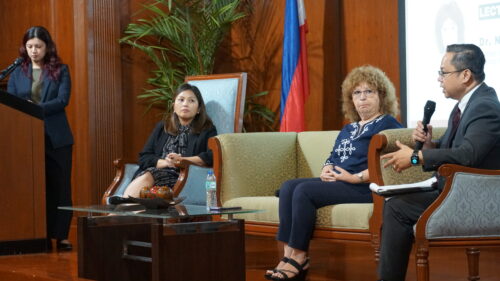THE UP INSTITUTE OF INTERNATIONAL LEGAL STUDIES HOSTS A DISCUSSION WITH DR. NILÜFER ORAL ON INTERNATIONAL TRIBUNALS AND THEIR ADVISORY OPINIONS
The Department of Foreign Affairs, through the Office of United Nations and International Organizations (UNIO), the UP Institute of International Legal Studies (UP IILS), and the UP Institute for Maritime Affairs and Law of the Sea (UP IMLOS), hosted a public lecture delivered by Dr. Nilüfer Oral, a member of the International Law Commission (ILC) and a leading authority on the intersection of climate change and the law of the sea. Dr. Oral is also the Director of the Centre for International Law at the National University Singapore. The public lecture entitled The Role of International Tribunals and their Advisory Opinions in Global Climate Action was held last August 27, 2024 at the Malcolm Hall Theater of the University of the Philippines (UP) College of Law, Diliman, Quezon City, Philippines.

Dean Darlene Marie Berberabe of the UP College of Law opened the event and highlighted in her welcome remarks the importance of strong international legal mechanisms for global climate action, especially for vulnerable states like the Philippines. The turn to international tribunals like the ITLOS and ICJ, Dean Berberabe noted, would greatly aid in clarifying the legal obligations of states with respect to climate change.

Dr. Oral prefaced her lecture with a presentation of the scientific evidence informing the Request for an Advisory Opinion submitted by the Commission of Small Island States on Climate Change and International Law to the International Tribunal on the Law of the Seas (ITLOS). The public lecture highlighted the novel nature of the Advisory Opinion and the unique challenges presented by climate change on intersecting legal regimes. The United Nations Convention on the Law of the Sea (UNCLOS), though an earlier legal regime with an encompassing scope, interacts directly with the later, more specific legal frameworks of the United Nations Framework Convention on Climate Change (UNFCCC) and the Paris Agreement.
In discussing the key points of the May 2024 ITLOS Advisory Opinion, Dr. Oral stressed the significance of the tribunal’s finding that anthropogenic greenhouse gas (GHG) emissions are considered as marine pollution under the UNCLOS. The Advisory Opinion also declares that the degree of due diligence required of states is a stringent one in light of the high risk of serious, irreversible harm to the marine environment. Dr. Oral emphasized that notwithstanding general rules of interpretation in international law involving special legal regimes, the UNCLOS remains supreme in all matters related to the ocean.
Delivering reactions to the public lecture were UP IILS Director Associate Professor Rommel J. Casis and Assistant Professor Jacqueline Joyce F. Espenilla, who chairs the International and Maritime Law Department of the Philippine Judicial Academy and concurrently serves as a Senior Fellow at UP IMLOS. Assoc. Prof. Casis and Asst. Prof. Espenilla are regular faculty members of the UP College of Law.
Assoc. Prof. Casis honed in on the significance of advisory opinions rendered by international tribunals in shaping the fundamental terrain of sources of international law. Meanwhile, Asst. Professor Espenilla engaged the concept of equity as it applied to climate change together with the underlying reference to the principle of Common but Differentiated Responsibilities (CBDR).

During the open forum, audience members fielded questions to Dr. Oral, Assoc. Prof. Casis, and Asst. Prof. Espenilla on complex issues including enforcement, the significance of advisory opinions on climate litigation strategies for non-state actors, the role of scientific evidence, and the varied capacities of developed and developing states.
Key stakeholders in global climate action were in attendance including officials of the Climate Change Commission, the International Maritime Organization, and representatives from civil society organizations like Greenpeace. Representatives from various government offices also attended the public lecture, consisting of delegates from the Supreme Court and the Congress, the Office of the Solicitor General, the Foreign Service Institute of the Department of Foreign Affairs, and the Philippine Space Agency. Members of the academic community, including officers of the Philippine Association of Law Schools and faculty members from the UP College of Law and Manuel L. Quezon University College of Law were also present.







































































































 on the upper right corner to select a video.
on the upper right corner to select a video.